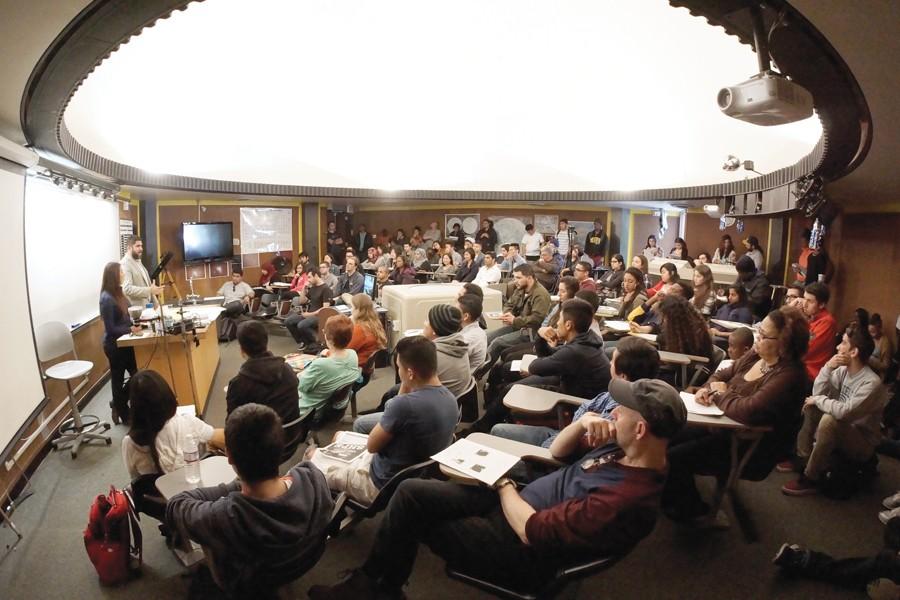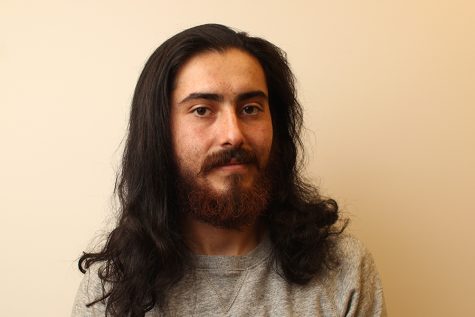Engineers explain “power of networking’
Speakers emphasize importance of creating connections with peers, establishing financial aid plan
Students listen to life experiences by Society of Hispanic Professional Engineers non-student President of the San Francisco chapter, Aaron N. Martinez during a forum in the Planetarium in the Physical Science on Friday.
Mar 4, 2015
A panel of professional engineers shared experiences from before and after their transition into the workplace with a group of students crammed into the Planetarium in the Physical Science Building on Friday at 2 p.m.
The three engineers are members of the Society of Hispanic Professional Engineers (SHPE) of the San Francisco and Silicon Valley non-student chapters.
While each represented different career paths within the discipline, they all highlighted a distinguishing skill to develop no matter which branch of engineering a student chooses to pursue.
SHPE Silicon Valley chapter Community Outreach Chairperson, 26-year-old Andrew Mairena, said he worked on multiple projects for companies that he would not have known about without reaching out and making connections with his peers while studying at UC Berkeley.
Mairena said while studying with other engineering students is important, nurturing a relationship with them is essential because these are the people who could possibly open up future job offers.
“I just want to emphasize that you should never underestimate the power of networking.”
He said that these relationships he built in college are what helped him get hired at his current position as an application development engineer for DCG Systems, a worldwide designer and manufacturer of integrated circuits that are used to power the various mobile devices used today.
Another speaker on the panel was 27-year-old Marisela Rocha, treasurer of the SHPE San Francisco chapter and a civil engineer working for the U.S. Army Corps of Engineers.
“I have a lot of friends that are unable to find jobs because they were always too busy with school and didn’t enjoy any of organizations the colleges offer,” Rocha said to the crowded room of students in the Planetarium. “Now they are struggling to get a job because they don’t know anyone in the industry and have no connections at all.
“So it’s very important that you do that right now during college because when you graduate you may be able to say ‘I have a degree and I know a lot’ but if you don’t know anyone your resume is going to be buried in the pile of others.”
SHPE non-student President of the San Francisco chapter, currently working for Macy’s as a application manager, Aaron N. Martinez said, “Don’t just focus on school.
“Everyone is trying to get those straight A’s, so what is going to distinguish you from those other individuals is being involved with clubs. It helps taking on leadership positions to show employers that you put yourself out there to improve your leadership skills.”
Contra Costa College’s SHPE student chapter President Valeria Avila and Vice President Christian Talavera contacted the speakers while Dr. Seti Sidharta, the Center For Science Excellence (CSE) coordinator, reserved the room for the panel of engineers to answer student’s questions.
CCC student Javier Ochoa, civil engineer major, said the responses of the panel of working engineers were “motivational.”
A question that sparked a lot of interest among the crowd was Talavera’s when he asked how do you maintain an academic drive at a four-year university when working while going to a community college can already be stressful.
The speakers unanimously agreed that student grants and loans are the best options to ease at least a portion of the stress.
Mairena related to Talavera by briefly talking about his hectic life as a community college engineering student, who worked two jobs and played soccer, helping him during his transition into a four-year university.
“You may feel like you are kind of at a disadvantage because you had to work and go school (simultaneously) and now you have to compete with these other engineers who have been there since freshman year so they’ve got the system down,” he said.
“But I saw being a transfer student as a blessing because we are there for a shorter amount of time. I myself took out a loan, and quit my job but was glad because I was able to get in there and focus (on getting a degree).”
Martinez said, “Don’t think of it as debt. Think of it as an investment that it will repay for itself over time.”



